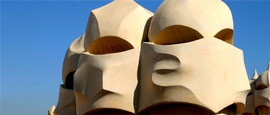Barcelona History
The pre-Roman history of the Barcelona area is disputed, though settlements dating back thousands of years have been found here. It is thought that the Laietani, an Iberian people, settled here in the 3rd century BC. During the 2nd century BC the Romans contested the peninsula with Carthage, and by the end of the 1st century BC, the Roman colony of Barcino was well established.
With the eventual fall of the Empire in the 5th century, Barcelona was conquered by the Visigoth kingdom, By the 8th century, Moorish armies swept through the Iberian peninsula and took the city. It changed hands again in 801 when the Franks took control.
In the 9th century, Guifré el Pelós brought most Catalan counties under the House of Barcelona. By the end of the 12th century, it had combined with Aragon through marriage and over the next two centuries the Catalan-Aragonese Empire sprawled through Catalonia, southern France and even southern Italy.
After Ferdinand of Aragon and Isabel of Castile married in 1469, Spain finally incorporated the Catalan region, which revolted against royal authority in 1640 and declared a republic. Philip IV crushed the rebels in 1652.
After the War of the Spanish Succession from 1701 to 1714, things got worse for the city. Defeat by the Bourbons after the Siege of Barcelona led to the abolishment of Catalan political institutions, while Castilian law was imposed in the newly centralised Spain.
The city recovered through trade and industrialisation, and by the 19th century, Catalonia was the richest region in Spain. Barcelona absorbed six municipalities in 1897 and the new district of the Eixample was laid out, while modernist architecture by the likes of Gaudí filled the city.
Barcelona was bombarded for three days in March 1938 at the height of the Spanish Civil War, and fell into nationalist hands in January 1939. Again, Catalan identity was suppressed, but its wealth continued. After Franco died in 1975, the area gained status as an autonomous community. Despite this, calls for greater powers and even independence have intensified over the decades, headed by Barcelona.
Did you know?
• One myth names Hercules as the city’s founder, another Hamiclar Barca, father of Hannibal.
• The Olympic Games in 1992 is credited with spurring Barcelona’s development into a modern, global city.
• During the three-day bombing of Barcelona in the Spanish Civil War, up to 1,300 people died and 2,000 were wounded. The air raids were launched by Mussolini, who supported Franco.
Do you have any Feedback about this page?
© 2026 Columbus Travel Media Ltd. All rights reserved. No part of this site may be reproduced without our written permission, click here for information on Columbus Content Solutions.




 You know where
You know where